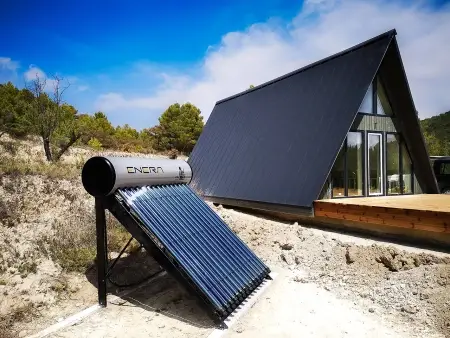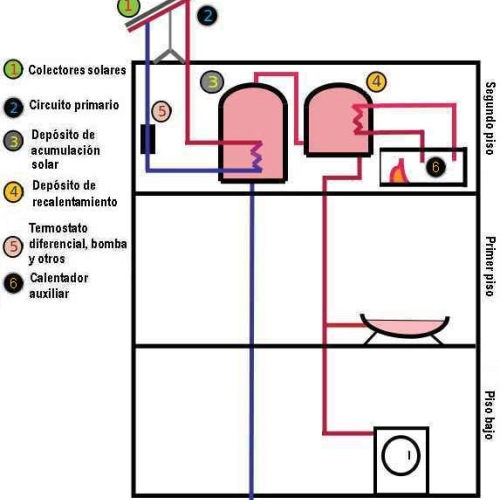
Solar energy has become an increasingly popular and accessible option for homes around the world. One of the most common applications of solar energy in the home is the solar water heater.
This system takes advantage of solar radiation to heat water for domestic use, thus reducing dependence on fossil fuels and contributing to environmental sustainability.
In this article, we will explain in detail the installation of a solar heater, its benefits and important considerations when looking for a good installer in your area.
How does a solar water heater work?
Before we dive into installation, it's helpful to understand how a solar heater works.
A solar heater consists of different elements, including solar collectors and a storage tank. Solar collectors are made up of panels or tubes that absorb solar radiation and transfer heat to the water that circulates through them.
This hot water is stored in a tank for later use in showers, faucets, washing machines and other household applications.
Benefits of installing a solar water heater
Installing a solar water heater involves an economic investment that is offset by the following benefits:
- Energy and Cost Savings: By utilizing the sun's free energy, a solar heater can significantly reduce conventional energy consumption (traditionally electricity or natural gas) and therefore utility bills. In the long term, this can result in considerable savings on your electric bill.
- Environmental sustainability: By opting for solar energy, you are contributing to the reduction of greenhouse gas emissions and dependence on non-renewable resources, which helps preserve the environment for future generations.
- Energy independence: By generating your own energy through solar panels, you reduce your dependence on the electrical grid and are less exposed to the volatility of the price of fossil fuels.
- Durability and low maintenance: Solar heaters typically have a long lifespan and require little maintenance, making them a solid long-term investment.
Important considerations before installation
Before proceeding with the installation of a solar heater, there are several important factors to consider:
- Orientation and available space: Solar collectors should be oriented south in the northern hemisphere (or north in the southern hemisphere) to maximize solar energy collection. Additionally, sufficient roof or floor space is needed to install the collectors and storage tank.
- Local Climate: The amount of solar energy available varies depending on geographic location and local weather conditions. It is important to take these factors into account when sizing the system and estimating its performance.
- Regulations and Permits: Before installation, it is crucial to research and comply with local regulations and permit requirements related to installing solar systems.
- Cost and return on investment: While solar heaters can provide long-term savings, it is important to evaluate the initial installation cost and calculate the return on investment to determine if it is a viable option for your specific situation.
To carry out these studies, it is often necessary to consult with a professional in the sector. Most solar panel installers offer these services.
Step-by-step installation process
First, a professional installer will evaluate your home to determine the best location and orientation for the solar collectors, as well as to verify the structural adequacy of the roof or installation area as we have mentioned previously.
 The installer will then make a complete diagram of the solar heater installation and recommend the most suitable size and type of solar system for your home based on the evaluation of the site and your hot water needs.
The installer will then make a complete diagram of the solar heater installation and recommend the most suitable size and type of solar system for your home based on the evaluation of the site and your hot water needs.
At the time of installation the solar collectors will be mounted on the roof or on a suitable structure on the ground using strong and secure brackets. At the same time, pipes will be installed to connect the solar collectors to the storage tank, ensuring an adequate flow of hot water and following the previously designed diagram.
Finally, the storage tank will be located in a convenient location within your home, such as the basement or utility room, and will be connected to the existing plumbing system.
Once installation is complete, testing will be performed to ensure that the system is operating correctly and guidance will be provided on its operation and maintenance.
How to find a good installer
When searching for reliable solar installers, it is essential to take a meticulous and knowledgeable approach. Below we give some recommendations:
Start your research using online resources, such as specialized renewable energy directories, where you can find a list of installers in your area. Also take advantage of reviews and testimonials from previous clients to evaluate the quality of the service they offer. Also, don't underestimate the power of word of mouth; Ask friends, family and neighbors about their experiences with solar installers and if they have any recommendations.
Another option is to consult with local organizations dedicated to promoting solar energy and sustainability. These organizations can provide you with valuable references of quality, reliable installers operating in your area.
Once you've identified some potential installers, it's crucial to investigate further. Check their credentials and experience in the solar industry, ensuring they are certified by recognized organizations. Request multiple quotes to compare prices, services and installation times.
Schedule meetings or calls with potential installers to discuss your project in detail. Ask specific questions about their experience, installation processes, warranties, and customer service policies. It is also important to ask for references from previous clients and contact them to get direct information about their satisfaction with the installer.
Finally, before committing to an installer, verify that they are properly licensed and insured according to local regulations. By following these steps, you can increase your chances of finding a reliable and competent installer who will ensure the long-term success of your solar energy project.
Conclusions
Installing a solar water heater can not only reduce your energy costs and environmental footprint, but it can also increase the value of your property and provide you with a reliable source of hot water.
By choosing solar energy, you are investing in a more sustainable and resilient future for yourself and for generations to come. If you're considering the transition to solar energy, installing a solar water heater is a great place to start!